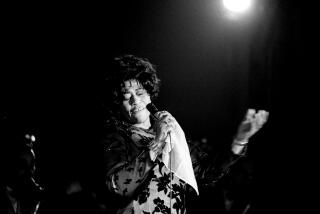Beautiful and Doomed
- Share via
Zelda needs no last name nor does she need introduction as the wife of F. Scott Fitzgerald. Books abound on this dazzling, celebrated, literary American couple of the ‘20s and ‘30s--their drinking, their antics, their love, her madness.
Viewpoints differ. Some say he stole his stories from her and used her sharp wit. Can one deny his own wit and talent? She was his heroine in and out of life. Did they not exchange ideas constantly? Feminists blamed him for inhibiting Zelda’s own creative urges, which ultimately drove her mad. True or false? The debate may never be settled, and this film accentuates an abusive Scott. It ignores his essential politeness and his generosity to other young writers (Hemingway). Somehow during this high-living time he wrote “The Great Gatsby.”
When I knew him in later years he continued to be an incredibly creative storyteller, still reaching for a dream (“The Last Tycoon”) despite his damaged life and financial hard times.
For years, their daughter Scottie objected to filming her mother’s life. She grew up in the shadow of Zelda’s love and illness. She knew how quickly her mother’s moods could slide the scale from high to low. She knew that her father was the strength of their small family and was the one she turned to for guidance. She knew that he supported them by writing. But Scottie is gone now.
This “Zelda” focuses on the excesses of their youthful marriage and first flush of success. Handsome, acclaimed, brilliant, they kicked up their heels like a couple of thoroughbred racehorses challenged by their wins as well as by their losses.
Their behavior was outrageous, and the actors play it hard. Natasha Richardson as Zelda is intense and convincingly out of control, though too beautiful. There is no sign of ravage. Timothy Hutton’s resemblance to the Fitzgerald I remember is eerie. He looks at once wild, seductive, loving and reflective, though the role is written in gin.
This is a desperate, destructive love story. Zelda was bright, quick and talented but undisciplined. When she finally attempted the discipline necessary to be a ballerina, it was too late. She broke. All she had left was Scott. He took care of her forever after.
“Zelda” is, of course, a movie not a biography, and I viewed it as such. I kept recalling a letter Zelda wrote me after Fitzgerald died in 1940, which puts the portrait in perspective:
“ ... I still half-believe that I will be hearing on Monday from California. Life descends like the dropping of a portcullis instead of the promise of a garden gate when good friends die and one is bereft of the happy haven of a heart that cared.”
Frances Ring is the author of “Against the Current: As I Remember F. Scott Fitzgerald,” based on her 20 months as his last secretary.
More to Read
Only good movies
Get the Indie Focus newsletter, Mark Olsen's weekly guide to the world of cinema.
You may occasionally receive promotional content from the Los Angeles Times.








